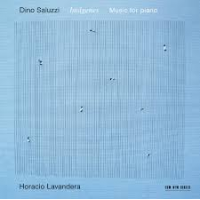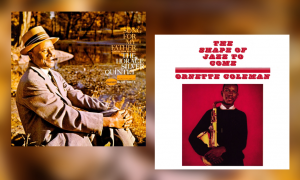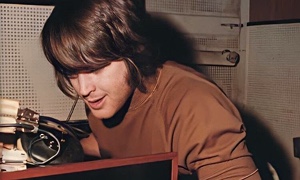Home » Jazz Articles » Building a Jazz Library » Classic Funk
Classic Funk
In rendering his decision in a 1964 obscenity trial, Supreme Court Justice Potter Stewart wrote: "I shall not today attempt to further define [pornography]... but I know it when I see it."
You really can't define the Funk, either. In a typical four/four stomp, Funk comes down hard "on the one," sure. And Funk often uses such instruments as guitars and keyboards more rhythmically (like percussion) than melodically. But no two people would give you the same definition of Funk. You can illustrate it by example, as a way of describing it, but you can't really define it.
So we cannot define the Funk, but we know it when we see it. Some stuff just got the Funk, while other stuff just does not. Little Richard's version of "Tutti Frutti" damn sure got the Funk—Pat Boone's version does not. "Hit the Road, Jack" by Soul Brother Ray Charles has got it—that same song done by the Lennon Sisters does not. The Isley Brothers and the Beatles found the Funk in "Twist and Shout," as did Al Green and Talking Heads with "Take Me To The River." Different types of Funk, but Funk just the same.
The Godfather of Soul, James Brown, is the recognized Founding Father of Funk. Brown made his reputation as the 1950s' Soul Brother Number One, a blistering soulman who could stomp out up-tempo numbers and scream out slow-grooving ballads with hurricane force. But in the mid 1960s, Brown's music underwent an utter, unalterable sea change. It grew more strident and powerful, more primal and urgent. Somehow "hotter." The Frankenstein of Funk upon which subsequent mad doctors such as Sly Stone, the Bar-Kays, Cameo, Earth Wind & Fire, Kool & The Gang, Prince, and of course the various mutations of Parliament-Funkadelic based their own creations.
So put a glide in your slide, a dip in your hip, and come onboard to the Mothership.
 Sly & The Family Stone: Stand! (Sony, 1969)
Sly & The Family Stone: Stand! (Sony, 1969) Visionary Funk swathed in nearly every style and hue: Sex music (the throbbing instrumental "Sex Machine"), dance music ("Sing a Simple Song"), rhythm n' rock ("I Want to Take You Higher"), pop ("Everyday People"), even social commentary ("Don't Call Me Nigger, Whitey"). Protean Funk.
 James Brown: Sex Machine (Polydor / PGD, 1970)
James Brown: Sex Machine (Polydor / PGD, 1970) The first atomic bomb of super heavy monster Funk, this double-live set presents perhaps the greatest version of the JBs band (including Bootsy Collins, Bobby Byrd, Maceo Parker, Fred Wesley and Clyde Stubblefield) in a set list balanced between Brown's Soul classics and his Brand New Bag. Explosive!
 Miles Davis: A Tribute to Jack Johnson (Sony, 1970)
Miles Davis: A Tribute to Jack Johnson (Sony, 1970) Davis' tribute to the first black heavyweight boxing world's champion proved as flamboyant and controversial as its namesake, crackling with electric guitar chords borrowed from Funk and Rock and with rhythms from Sly Stone and James Brown. Davis on trumpet is energetic, expansive and fearless.
 James Brown: In The Jungle Groove 1969-'71 (Polydor / PGD, 1986)
James Brown: In The Jungle Groove 1969-'71 (Polydor / PGD, 1986) Anthology of Brown's most important transitional period in music and personnel. Through such tracks as "Give It Up or Turnit a Loose," the sexual "Hot Pants," and "Funky Drummer" (possibly the most-sampled rhythm track of all time), you hear Brown remake his sound from classic Soul to modern Funk.
 Donald Byrd: Black Byrd (Blue Note, 1972)
Donald Byrd: Black Byrd (Blue Note, 1972) Jazz Messengers graduate Byrd teams up with Soul, R&B, and Jazz session aces to stake the first claim "on the corner" of Jazz and Funk. Despised by purists (especially after it became Blue Note's top-selling release) and now slightly dated, but a masterpiece of influential instrumental Funk.
 James Brown: The Payback (Polydor / PGD, 1973)
James Brown: The Payback (Polydor / PGD, 1973) In the midst of personal and professional bad times, Brown arms himself to the teeth with Jimmy Nolen's razor-sharp guitar licks...and starts swingin' back. The title track remains one of Brown's most venomous and personal diatribes, with an intense lyrical ferocity matched by its merciless groove.
 Herbie Hancock: Headhunters (Sony, 1973)
Herbie Hancock: Headhunters (Sony, 1973) Hancock was among the first to explore the Funk possibilities of the synthesizer, splattering electric arrangements with simulated horn charts and guitar solos and doubling up the basslines to deepen the Funk. Famous for "Chameleon" but also updates "Watermelon Man" and pays tribute to "Sly."
 James Brown: Hell (Polydor / PGD, 1974)
James Brown: Hell (Polydor / PGD, 1974) Not without clunkers ("When The Saints Go Marching In," for starters). But its prime cuts cut stone to the bone: The anguished title track, this slippery update of "I Can't Stand It," the unrelenting epic (14 minute) throb of "Papa Don't Take No Mess" and the furious, primal "My Thang."
 Parliament: Mothership Connection (Polygram, 1975)
Parliament: Mothership Connection (Polygram, 1975) The Second Funk Revolution: An outrageous outta-space odyssey born screaming full-grown, with Maceo Parker and Fred Wesley stoking up the engine room. In addition to the title track, gives up "P.Funk (Wants to Get Funked Up)" AND "Give Up the Funk (Tear the Roof off the Sucker)." Frighteningly good.
 Bootsy's Rubber Band: Ahh...The Name is Bootsy, Baby! (Warner Bros. / WEA, 1977)
Bootsy's Rubber Band: Ahh...The Name is Bootsy, Baby! (Warner Bros. / WEA, 1977) Co-written and co-produced with George Clinton, and with Parker, Wesley, and other P-Funkers bouncing in his Rubber Band, Bootsy's second is probably the most fully realized P-Funk solo record. The fast tunes rock, the slow tunes groove—this Bootsy's made for fonk-in'!
 Funkadelic: One Nation Under A Groove (Capitol, 1978)
Funkadelic: One Nation Under A Groove (Capitol, 1978) The hand-clapping title anthem went to #1 R&B and helped popularize the flowing yet stomping synthesizer bass sound (a Funk staple ever since). Cuts such as "Who Says A Funk Band Can't Play Rock?!" and "Lunchmeataphobia (Think! It Ain't Illegal Yet!)" helped the P-Funk vibe remain loud and proud.
 Parliament: Tear the Roof Off: 1974-'80 (Mercury / Universal, 1993)
Parliament: Tear the Roof Off: 1974-'80 (Mercury / Universal, 1993) A simply great anthology: 25 songs across two CDs encompassing every hit, with single versions, full album versions, extended 12" mixes and versions recorded in concert, some appearing on CD for the first time. Absolutely essential to an understanding of modern hardcore Funk and R&B.
 Rick James: Street Songs (Motown / PGD, 1981)
Rick James: Street Songs (Motown / PGD, 1981) A shotgun blast of nas-tay, James' masterwork presents a tapestry of "Ghetto Life" full of gettin' high and profane sex. Includes the kinkfest "Super Freak," the steamy "Fire and Desire" duet with Teena Marie, and "Give It To Me, Baby," possibly one of the best booty calls ever.
 The Meters: The Very Best of the Meters (Rhino / WEA, 1997)
The Meters: The Very Best of the Meters (Rhino / WEA, 1997) The Meters played on nearly every great record to come out of New Orleans (they're the seething rhythm, for example, behind "Right Place, Wrong Time" and "Lady Marmalade"). Steaming helpings of their original Crescent City Funk; organic and spacious and warm, and deeply steeped in Southern Soul.
 War: Grooves & Messages: The Greatest Hits (Avenue, 1999)
War: Grooves & Messages: The Greatest Hits (Avenue, 1999) A chronological sequencing of every hit from the world's most successful Afro-Cuban-Soul-Jazz-Funk-Rock band (so far), plus a bonus remix CD. Jazz-y Funk meets the West Coast barrio, tossed together under the warm Southern California sun but with a surprisingly dark, tough underbelly.
Trouble Funk: Live (Infinite Zero, 1981)
Thick and meaty slices of Go-Go Funk, a percussion-fueled, call-and-response style that rocked East Coast clubs in the 1980s. Four live jams—not songs (they're labeled Parts A through D)—of unrelenting throb about fifteen minutes each. The ultimate party-in-a-box.
Tags
PREVIOUS / NEXT
Support All About Jazz
 All About Jazz has been a pillar of jazz since 1995, championing it as an art form and, more importantly, supporting the musicians who make it. Our enduring commitment has made "AAJ" one of the most culturally important websites of its kind, read by hundreds of thousands of fans, musicians and industry figures every month.
All About Jazz has been a pillar of jazz since 1995, championing it as an art form and, more importantly, supporting the musicians who make it. Our enduring commitment has made "AAJ" one of the most culturally important websites of its kind, read by hundreds of thousands of fans, musicians and industry figures every month.
























